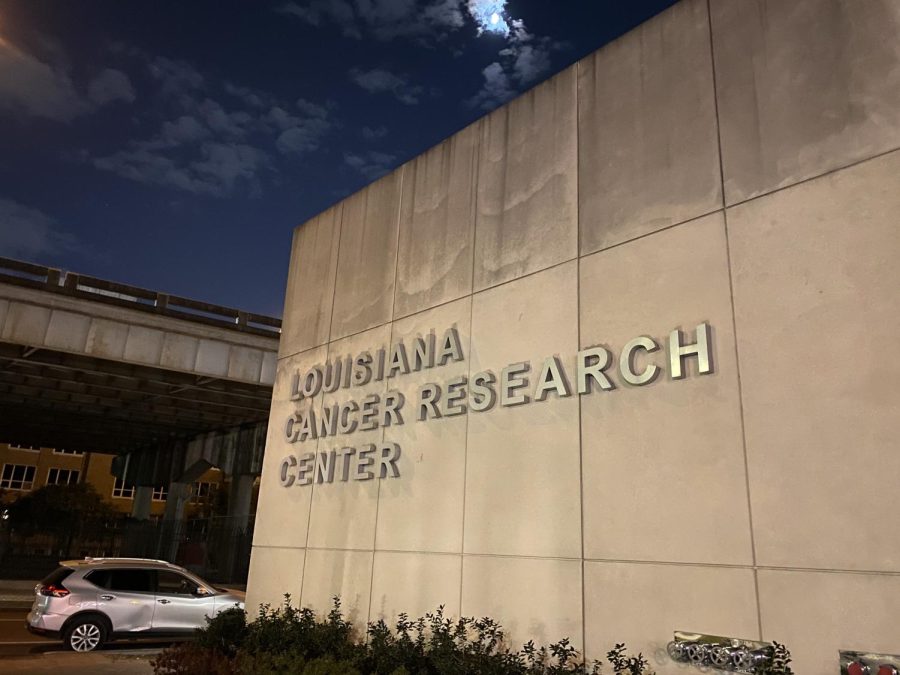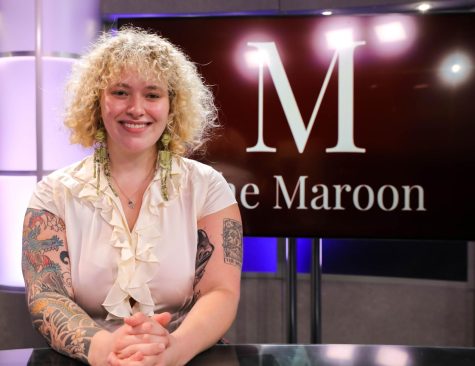Louisiana Cancer Research Center aims to treat state cancer crisis
A sign for the Louisiana Cancer Research Center is displayed on Tulane avenue in New Orleans, Nov. 2. The center is working to give the highest quality care and earn National Cancer Institute Designated Cancer Center accreditation.
November 3, 2022
The Environmental Protection Agency recently released a letter that demonstrates the disproportionate impact cancer is having on Louisiana’s Black community. The letter was sent to the state’s Department of Environmental Quality and Department of Health to “present significant evidence suggesting that the departments’ actions or inactions have resulted and continue to result in disparate adverse impacts on Black residents of St. John the Baptist Parish, St. James Parish, and the Industrial Corridor.”
Director and CEO of Louisiana Cancer Research Center Joe W. Ramos, Ph.D. said he and the center are working to care for people with cancer and educate those in the community about the disease’s impact on the state. Ramos said that mission is the reason he moved to New Orleans from the University of Hawaii Cancer Center. The Louisiana Cancer Research Center was founded in 2002 by the Louisiana State Legislature and is a collaboration between Tulane University, Xavier University of Louisiana, Louisiana State University and Ochsner Health.
The goal of equity
Ramos said there are disparities as cancer impacts the Louisiana community.
“Not everyone is hit equally hard. Our African American population continues to be hit harder by certain types of cancer, like triple-negative breast cancer,” he said
These cancer disparities cause cancer to appear more in some populations and also lead to a higher mortality rate in some populations.
“There are health equity issues in the state too,” Ramos said. “How do we make sure everyone has access to what they need for treating their cancers and diagnosing their cancers and preventing them in the first place?”
Ramos said Louisiana is consistently the hardest hit with cancer with 28,680 estimated new cancer cases in 2022, according to the American Cancer Society. For scale, that number represents about 7% of the total New Orleans population.
“That’s a number but remember, everyone in that number is a story,” Ramos said. “All 28,000 people have their own stories, their own family and their own challenges.”
Cancer and Louisiana’s landscape
Christopher Williams, second-year medical student at William Carey College of Osteopathic Medicine, said many areas of New Orleans and small towns in Louisiana have high exposures to cancer-risk materials.
“A lot of the places in Louisiana that used to have timber and oil facilities around them have been designated as EPA Superfund sites,” Williams said.
EPA’s Superfund program identifies and helps to restore the country’s most contaminated land.
“In industrial work like fracking, you use industrial chemicals to help break up the ground. Some of the particles in these industrial chemicals and water used in the hydraulic drilling process can leak into aquifers. Slowly, over time, they can go and release carcinogens,” he said.
Ramos said that predictions show that about 9,000 people will die this year in the state of Louisiana from cancer.
“That is an incredibly high set of numbers for a state that has about four and a half million people in it,” Ramos said. “Louisiana really suffers dramatically compared to other states from cancer. No matter the incidence and mortality of cancer, we’re always going to be working hard to get that number down,” he said.
A new approach to cancer
Ramos said his goal as director is to attack cancer holistically by preventing cancer, early cancer diagnosis, creating more cancer treatments and educating the community.
Investing time, effort, and money into finding new approaches to develop new therapies is one of the ways Ramos said the center is working to serve the state.
“Our work with our communities is informed by our communities to benefit our community. Our work is really something that we do in close collaboration with people on the ground and in the various communities across the state,” Ramos said.
This summer, the Louisiana Cancer Research Center announced that they plan to become a hub for cancer treatment, research, and care.
Williams said positioning New Orleans as the cancer treatment hub of the state would allow for an international and multifaceted approach to cancer.
“If you’re in a location where great minds with different perspectives can come in and out from other areas and countries, you’re able to come together and create collaborative solutions,” Williams said. “A large percentage of symptoms are very nuanced and very rare whenever it comes to cancer research. A lot of the time, if you can figure out the problem to one thing, you can superimpose some of the strategies and perspectives that you had and apply them to another cancer,” he said.
Striving for high quality care
The center said one of its goals is to give the highest quality care and earn National Cancer Institute Designated Cancer Center accreditation.
“It’s a grant for supporting cancer research. It goes to places that have high numbers of inclusive high-quality cancer researchers doing holistic work,” Ramos said. “The grant provides background infrastructure for researchers and shared resources like core labs. It also provides developmental funding so they can try out brand new ideas to try a really risky idea that may pay off and further help the community,” he said.
While the cancer treatment hub will be concentrated in New Orleans, Ramos said that there are talented researchers in areas across the state and the center is working to ensure that they are engaged in the work as well.
“If they’re working in Shreveport or Baton Rouge or Lafayette or Monroe, we want to make sure that we do everything we can to share what we’re learning and give them access to some developmental funds,” Ramos said. “It starts here because this is where we have the highest concentration of people doing this kind of research, but it’s not exclusively in New Orleans because we need everybody across the state engaged.”
Ramos said the Louisiana Cancer Research Center is focused on doing the highest quality, highest impact research in the service of the state’s communities.
“That’s a hard thing. To actually change lives because of our work is incredibly difficult and that’s our highest goal,” Ramos said. “The journey is as rewarding as getting to the destination, because that means that we’ll be working towards serving our community regardless of whether we have the National Cancer Institute designation.”









